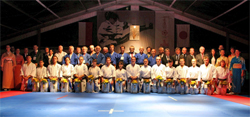On the Issues: Preventing Conflicts and Peacebuilding through Athletic Competition
USIP’s Soolmaz Abooali takes a look at how karate and other sports can help stop fights before they happen. She recently participated in the 2009 World Cup in Poland, where she placed second in the competition.
Posted: January 12, 2010
USIP’s Soolmaz Abooali takes a look at how karate and other sports can help stop fights before they happen. She recently participated in the 2009 World Cup in Poland, where she placed second in the competition. View photos from the competition.
- Please explain the style of karate that you practice?
- A major component of USIP's mission is to prevent violent conflict around the world. Does traditional karate fit into this goal? If so, how?
- How do you bring the benefit of traditional karate into the work you do as a research assistant in Education and Training Center International?
- How can others who compete in sports incorporate conflict prevention and peacebuilding into their activities?
Please explain the style of karate that you practice?
Shotokan karate is a traditional style of martial arts, which originated in Okinawa, Japan. It emphasizes the improvement of mind and body on a daily basis, without any limits, through rigorous practice. The essence of traditional martial arts lies in the usage of the body and mind to execute an explosive technique. In other words, the traditional karate practitioner practices with the realization that she will have only one chance to defend herself; there is no room for a mistake. Practitioners continuously strive to improve their skills, with this training and mentality eventually becoming a way of life.
A major component of USIP's mission is to prevent violent conflict around the world. Does traditional karate fit into this goal? If so, how?
 The philosophy of this art can be summed up in the following statement made by the founder of Shotokan, Gichin Funakoshi: "Being glorious in a hundred battles is not as important as winning a battle without fighting it."
The philosophy of this art can be summed up in the following statement made by the founder of Shotokan, Gichin Funakoshi: "Being glorious in a hundred battles is not as important as winning a battle without fighting it."
In karate, every form ("kata" in Japanese) starts with a defensive technique as opposed to an offensive one. So, we don’t ever start a conflict but rather try to avoid it. If avoidance, negotiation and cooperation don’t work, then it becomes a matter of defending oneself and destroying the attacker. This is the only time that destruction becomes acceptable – after all avenues of resolution have been exhausted, including defending yourself. But again, and as the quote implies, the goal is to win a battle without actually fighting.
So, how is this aligned with USIP’s goal of conflict prevention? Traditional karate practitioners are trained to be calm in stressful situations through their training so that they can think clearly and identify all possible solutions to a conflict. Having multiple solutions will of course help resolve a conflict better than having only one. We also learn to work as a team, meaning that we create a cooperative and supportive environment to support our goal.
In competitions, there are many conflicting parties (or countries/teams) with commonalities and shared goals – our love for karate, competition, and/or winning the gold medal. These shared interests create a basis for building trust among the athletes – the very same trust that is essential for peacebuilding and conflict prevention.
In short, traditional karate fits into USIP’s goal through learning how to be calm in conflict situations, through identifying multiple solutions to a conflict through analyzing the opponent, and through finding commonalities that can be used for building trust.
How do you bring the benefit of traditional karate into the work you do as a research assistant in Education and Training Center International?
I put myself through rigorous training, particularly during competition times, and I expect to get certain results. I bring this same attitude into my work by first understanding what exactly I am supposed to accomplish for a given task. Then I put in the time and effort in order to achieve the goal(s). The Education and Training Center International dedicates itself to executing high quality work and I want to make sure that I contribute to this. Utilizing the benefits that I have gained through my practice in traditional karate is one way I ensure this.
How can others who compete in sports incorporate conflict prevention and peacebuilding into their activities?
This is a great question because conflict prevention should be approached from many different angles.
An effective yet undeveloped angle is the use of sports in conflict prevention and peacebuilding. Athletes are always faced with some sort of conflict; whether it’s with their teammates or conflicts within them. In order to succeed, they must work with those involved in the conflict or find a way to deal with whatever is going on. Skills such as teambuilding, creating camaraderie and fostering a supportive environment become necessary. If you think about it, all these skills require the ability to identify shared interests, which can then be used as a basis for building trust.
So, athletes already possess and use key skills for conflict prevention and peacebuilding. Imagine if these skills, through the use of sports, could be maximized not just for competition but also to prevent conflict around the world!




